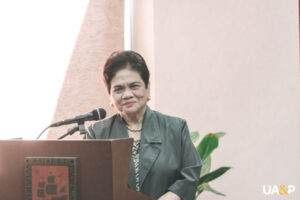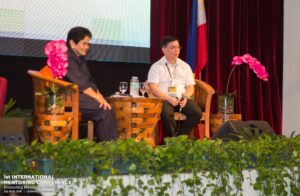This article first appeared in the March 2014 issue of Universitas.
A conversation between a young UA&P alumna and her former mentor turned out livelier (and more candid) than was “scripted.”
Concha de la Cruz , a faculty member of the School of Education and Human Development, and her former mentor, Dr. Rina Villegas, talk about the University’s mentoring program and how it has changed their lives.
As a long-standing mentor in UA&P, how do you think does the mentoring program conform to the vision and mission of the University?

I would like to base my reply on my own experience as a teacher, as an educator. What made me decide to pay more attention to mentoring? I have been teaching for almost 40 years, and like the typical teacher, I went through several stages. In the first two decades of my teaching, I noticed that I was so restless because there was something that I was looking for, there was something missing.
Perhaps I initially focused on just teaching the subject. So I wanted to go deeper and pay more attention to the research component of my teaching. But on the third decade of my teaching career, I realized that I was too focused on the depth and breadth of my discipline—values education, character education, and moral education—without considering significantly the importance of whether or not my students were really learning, or whether or not they have really reached a certain level of assimilation. Then I saw the importance of coaching them.
Coaching is, in essence, one on one. And this led to something more than the academic. It led to the integral aspect of mentoring, which is the holistic approach to helping the learners.
So, you need to bide time to be able to understand the thrust of the University. It may have taken long for me, but it was worth biding the time. And definitely, through that restlessness, I understood more clearly that the mentoring program indeed fits in with the vision and mission of the University.
So how is it relevant to the experience I have just shared? It made me understand better that the focal point of education is the individual person (and I can say that I have owned mentoring; it is practically my field). It was not talked about so much, but now more researches are coming up on mentoring, which is an essential component of the University’s commitment to personalized education and holistic formation. It cannot be therefore more fitting to put these two together.
We’ve already started to give mentoring training sessions both to new mentors and seasoned mentors. All these sessions have “building a culture of mentoring” as their objective. Can you enlighten us on what this culture is about?
To put it in a nutshell, the culture of mentoring simply means the culture of care. In a place where the culture of mentoring thrives, we will hear students say, “My mentor dealt with me as a person with dignity, and at the same time with kindness and understanding.” And the culture of care has to go beyond the person you are taking care of—the mentee—because that mentee is not in a vacuum. The culture should permeate the entire University.
When it comes to the environment of the University, people see that the setting is conducive to learning. Concretely, they note that aesthetic sense has helped them to form their own aesthetic values.
To put it in a nutshell, the culture of mentoring simply means the culture of care.
The ones who sow the culture of care are the mentors themselves. Seeing the way the teachers deal with one another with exquisite refinement is how the mentees learn what respect is all about. In other words, the seamless character of that culture of care can be a very vivid image for the mentees, and this will be a legacy the University can pass on to students from year to year.
How do you give advice to your mentees?
One thing I always remind myself of is not to pull out pieces of advice from my pocket. I have learned the importance of not pigeonholing my mentees or labeling them. One has to give advice according to what the mentee needs. And the mentee’s circumstances always provide the backdrop of the advice. In this way, they will realize, “Wow, you really know me. You really know my strengths and weaknesses. And at the same time, you give advice that is workable, that is within my capacity.”
In short, pieces of advice are always tailored to the mentees. We do not drown them with motherhood statements. The advice is also always positive and very encouraging. And it is not imperative. It is up to the mentee to take action or not.
We, mentors, should also remember that there are other good interventions in the mentees’ holistic formation. The mentor is just one of those interventions.

But sometimes mentoring sessions can just be sessions where you just talk and advice may not be—
May not even be needed. And advice can always be in the form of a suggestion. I tell my mentees “You may find out another way of addressing this, and let me know because I can learn so much from you.” It’s always a dialogue.
How about the challenges you face as a mentor—what are they?
Let me share with you a challenge that I personally experienced—the scarcity of time. Many mentoring gurus have said that scarcity of time is always going to be a problem for both parties. So I was particularly struck by a point made by a mentoring guru writing about it—I met her in a March 2012 international conference—who said that scarcity of time should not be viewed as a problem or a challenge. Because we have to go beyond the effectiveness of mentoring. It’s not just the one-on-one personal exchange. Mentoring is precisely where the hidden curriculum lies. This is how students soak up the teaching moment of the seamless character between what we espouse and what is seen around. So, that itself becomes a testament. Scarcity of time should never be a problem.
And then, another challenge is: “How do I know whether the mentees are projecting their real selves when they are talking to me?” I’m not saying that I don’t trust them. But this is precisely part of our human limitation. Mentees can say things just to please their mentors, as students will write things that will please their teachers. So, it’s a challenge, but I just have to be very positive. I just have to remind myself to believe in whatever my mentees tell me. And if she tries to project something that is not her real self, well, it is not I who loses. I’m gaining because I’m trusting. Eventually, that person, because she feels that she is trusted, will realize, “I cannot afford to play a game in mentoring.”
And the third challenge is this: We do have to seek them out. I always ask myself, “When will they ask for the mentoring session?” And something that I always have at the back of my mind is, “How sure am I that they really want to chat at that moment I’m chatting with them?” So I make it a point to make the mentoring session pleasant. And another thing—we have to remind ourselves that mentoring is a conversation; it’s not instruction.
The University has already set up a Mentoring Desk under the Center for Student Affairs, which is a reflection of the importance given to the mentoring program. What else are we expecting? What are your dreams for UA&P’s mentoring program?
One of my dreams is that we continue telling everyone that mentoring is indeed the niche of the University, and that we are now more deliberate in professionalizing it. There is a training program for mentors. The mentors realize that they have to hone their skills, their competency. Mentoring can’t be done in a charismatic manner just because it’s a conversation.
I have also realized that mentoring has to be studied more seriously. It has to be backed up by a research and development component, so the public can see that this intervention can really help students reach a certain level of excellence—because they have been guided about how to study well, how to discern, and how to hone their critical thinking skills.
And my other dream is for the mentoring program to have its own institute. As an institute, the program can share its practices more deliberately with other educational institutes, whether they be in basic or tertiary education.
The national conference on mentoring was held last September 14, 2012, and there are plans to organize a conference for countries in Asia and the Pacific. In other words, the nomenclature of “Asia and the Pacific” is being beefed up.

And when it comes to infrastructure, my dream is that it can have its own building. Or that it can occupy two floors in a building. There should be a lot of conducive mentoring rooms, so mentoring is not construed as a “behind-the-table” scenario. A lot of these mentoring rooms should be designed as a sala or salita, as we would say.
And, well, finally I hope that the mentoring program can adopt the Oxford tutorial system, which is very close to the heart of mentoring. It’s a one-on-one situation where the teacher is at the same time a mentor. The teacher guides the students to discover the delight of learning, and each student will be given academic requirements according to his or her capacity.
And lastly, do you have a mentor?
Definitely. It will be so hard for me to fall in love with something that I know does not have any basis. In other words, I will be able to transmit only what I have. So, whatever I had been sharing with the teachers or the seasoned mentors is based on my own experience. I exclaimed “definitely” because this is the very essence of the integrity of my profession. So, what I share is, more or less, the inner landscape of a teacher. And if I say that mentoring is an essential component of teaching, but I do not have a mentor, I will just be playing a game. One cannot give what one does not have.
And lastly, having a mentor helps me to be more open to learning. This is the secret of Michaelangelo, this is what made him great. He would always tell himself, “I’m always learning.” This is an intellectual humility of accepting, “Okay, I am improving in this particular talent given to me by God, but I need to continue learning.”
[To Ms. Concha] On the basis of your experience of our mentoring sessions, what can you say?
In the beginning, I religiously went to the mentoring sessions because I thought that it was mandatory. Now I think, and I’m sure all the other alumni and older students will agree, that mentoring becomes more and more relevant and meaningful as one grows older in the University. So, this means that we should give to the younger students what we think they can absorb in the beginning, and then let them discover, on their own, the value of mentoring as they go through the years. Knowing this helps me now as a young mentor, as I see my mentees have apprehensions when it comes to their own mentoring sessions.
(Dr. Villegas’ added input) And I think, when you are a mentor or a mentee, you are guided by the principles of education in freedom and responsibility. Since human freedom is an important element in the mentoring process, the outcome can be unpredictable. Mentors just have to do their best.#
Banner photo by Steve Johnson.
Leave a Reply